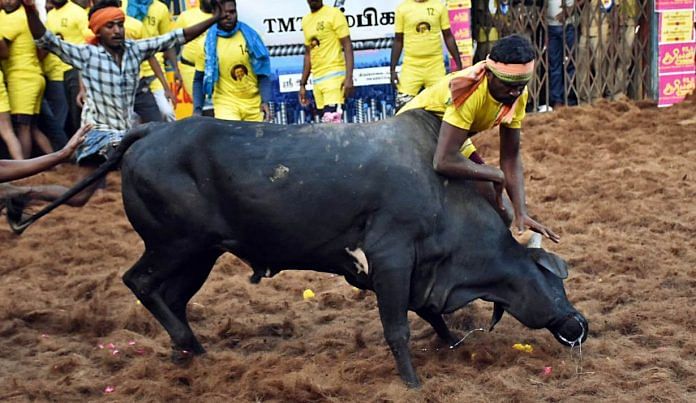Chennai: The Tamil Nadu law allowing the bull-taming sport jallikattu was Thursday upheld by a Constitution bench of the Supreme Court. Stating that the law does not go contrary to constitutional provisions, the Supreme Court pointed out that the law had received presidential assent.
The verdict by the five-judge bench also approved buffalo races in Maharashtra and Karnataka (kambala — the bull races).
Tamil Nadu Chief Minister said the verdict on jallikattu was “worth engraving in gold in the history of Tamil Nadu”.
However, the People for the Ethical Treatment of Animals (PETA), the main petitioner against jallikattu, said that, since 2017, “when Tamil Nadu state legislation allowed jallikattu to be held in the state again, at least 104 men and children, 33 bulls, and one cow have died”.
“This is NOT OK. True bravery lies in standing up for what’s right, NOT in mob violence,” it added.
Also Read: Jallikattu continues to be a bloody affair — for humans and bulls
Jallikattu, the traditional bull-taming sport
Jallikattu, also called “Eruthazhuvuthal”, means embracing the bull. It is played during the harvest festival Pongal in the jallikattu belt of the state, covering the districts of Madurai, Trichy, Theni, Pudukkottai and Dindigul.
Said to be over 2,000 years old, the sport involves a bull that is released from a ‘vaadivasal’, or the entry point to an arena, and young men who attempt to “tame the bull” by holding onto the animal’s hump for about 15-20 metres, or three jumps of the bull. If a tamer succeeds, he wins a prize. If not, the prize goes to the bull’s owner.
Jallikattu is also called a valour sport, and seen as a matter of pride for the bull owner as well as the tamer.
The prizes traditionally included dhotis, towels, bananas and small cash sums, but these days they could range from grinders, fans, fridges, and furniture, to bikes and hefty sums.
“Native-Indian-breed bulls like Kangayam, Umbalachery, Pulikulam, Barugur are reared by bull owners for jallikattu,” said animal activist Muralidharan Sivalingam.
“These bulls are like their family, and these poor farmers beat all the odds to participate in the competition.”
The sport has faced multiple hurdles since 2007, when petitions were moved in the Supreme Court against jallikattu, kambala and other bull races, by the Animal Welfare Board of India and PETA. At the time, however, the state government bypassed this by passing a law that was approved by the governor.
In 2011, the then UPA-led central government added bulls to the list of animals whose training and exhibition was prohibited. Based on this, jallikattu was banned by the Supreme Court in 2014.
In January 2017, jallikattu protests first began in Madurai’s Alanganallur, and over 200 people were arrested.
Protests soon erupted in different parts of the state, including at Chennai’s Marina Beach, which drew lakhs of participants.
The protests forced the then AIADMK government, led by O. Panneerselvam, which was still reeling under the demise of former CM J. Jayalalithaa, to promulgate an ordinance.
However, the protesters demanded a permanent solution, and the state government reassured them that the ordinance was that exactly.
The pro-jallikattu protests ended on a bad note with violence breaking out as police attempted to forcefully remove the protesters from the Marina Beach. Vehicles were subsequently set on fire, and several people were injured.
In July 2017, PETA filed a petition with the Supreme Court, seeking a renewed ban on jallikattu, and sought to have the state law — the Prevention of Cruelty to Animals (Tamil Nadu Amendment) Act of 2017 — declared unconstitutional.
“Today’s Supreme Court verdict is a huge victory that brings back all the memories of the protest, joy of achievement of the ordinance, and also reminds [us of the] struggle on the last day of the protest,” said Soundarajan M, an actor and social activist who participated in the jallikattu protest at Marina for 15 days.
“But all of it was worth it,” she added.
In its statement on the SC verdict, PETA said, “Today, the Supreme Court in essence said the display of FRAGILE and TOXIC masculinity you see here is OK.”
But Muralidharan refuted this, saying “foreign-funded organisations were trying to create a false image of the sport”.
Since 2017, when the Prevention of Cruelty to Animals (Tamil Nadu Amendment) Act was enacted, several rules and regulations have been brought in for the safety of the animals as well as the players.
The key points in the 23-point guidelines include a medical fitness test for the tamers and the bulls, double-barricade for the arena where the bulls run through, and keeping a mobile hospital and ambulance with necessary life-saving drugs ready to rush the injured to major hospitals in case of emergency.
Although this is a “victory of a people’s movement”, Soundarajan said, “Now we have to ensure that the rules and regulations are followed stringently and there is no scope for criticism.”
Political parties claim victory
BJP state president K. Annamalai thanked “Prime Minister Narendra Modi for his persistent effort to ensure the ban on the cultural sport of TN, jallikattu was lifted in its entirety”.
Ally AIADMK’s C. Vijaya Baskar blamed the UPA government for bringing in the ban on the sport, and credited the erstwhile AIADMK government for promulgating the ordinance that helped bring it back.
Former CM OPS dedicated the victory to the people of the state, and recollected his effort to bring back the sport.
CM Stalin said that, in January 2024, a victory event will be celebrated during Pongal in the massive jallikattu arena in Alanganallur, which is currently under construction.
Also Read: ‘Jallikattu’ has cultural value, no cruelty on bulls: Tamil Nadu tells SC



